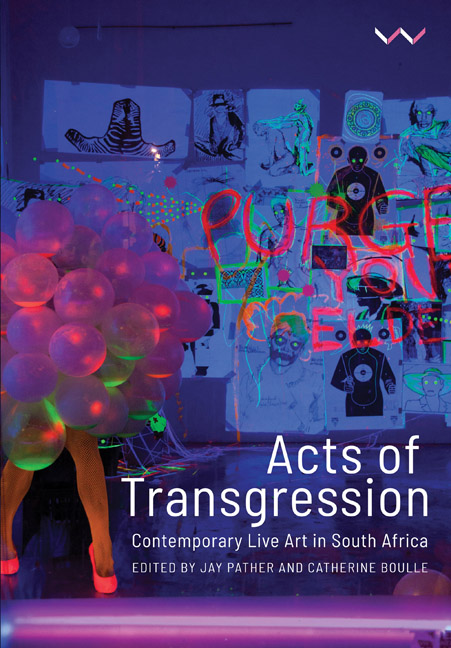Book contents
- Frontmatter
- Contents
- Acknowledgements
- Introduction
- PART ONE LIVE ART IN A TIME OF CRISIS
- 1 Artistic Citizenship, Anatopism and the Elusive Public: Live Art in the City of Cape Town
- 2 Upsurge
- 3 ‘Madam, I Can See Your Penis’: Disruption and Dissonance in the Work of Steven Cohen
- 4 The Impossibility of Curating Live Art
- PART TWO LOSS, LANGUAGE AND EMBODIMENT
- PART THREE RETHINKING THE ARCHIVE, REINTERPRETING GESTURE
- PART FOUR SUPPRESSED HISTORIES AND SPECULATIVE FUTURES
- Contributors
- List of Illustrations
- Index
3 - ‘Madam, I Can See Your Penis’: Disruption and Dissonance in the Work of Steven Cohen
from PART ONE - LIVE ART IN A TIME OF CRISIS
Published online by Cambridge University Press: 30 May 2019
- Frontmatter
- Contents
- Acknowledgements
- Introduction
- PART ONE LIVE ART IN A TIME OF CRISIS
- 1 Artistic Citizenship, Anatopism and the Elusive Public: Live Art in the City of Cape Town
- 2 Upsurge
- 3 ‘Madam, I Can See Your Penis’: Disruption and Dissonance in the Work of Steven Cohen
- 4 The Impossibility of Curating Live Art
- PART TWO LOSS, LANGUAGE AND EMBODIMENT
- PART THREE RETHINKING THE ARCHIVE, REINTERPRETING GESTURE
- PART FOUR SUPPRESSED HISTORIES AND SPECULATIVE FUTURES
- Contributors
- List of Illustrations
- Index
Summary
I feel really strange because I'm trapped into [an] old, white, male, patriarchal role that really doesn't fit me well. It's difficult to explain … that I'm not that thing that I am.
Steven Cohen, interview with the author, 6 March 2017Demographically and physically one thing; experientially, another. I would like to begin with a story and a saying that move from this point of incongruity. In a wideranging 2017 interview with Steven Cohen, the seminal South African performance artist related an anecdote from one of his earliest interventions, Dog. Uninvited, Cohen first publicly performed the piece in 1998 at the Goldfield's Kennel Club Obedience Show in Johannesburg's East Rand, Cohen inserted himself into the dog show lineup as a performing mongrel dressed in his iconic tutu, bare-bummed, a dildo up his anus and a bag covering his penis. Midway through his show-dog routine of flick flacks, jumps and somersaults, the ball bag flew off. Cohen recalled:
Afterwards, this nice lady came running up with my ball bag, and said: ‘Meneer, you forgot this.’ She's actually in the video, finally getting exasperated, getting up from her table in the background … Here's this Tannie who's like, everything you did is wrong, but this is your thing [I must return it]. I love that about people and society and that [sense of] always in two directions, always … And that's the value of performance, that pull hard in many directions at the same time.
In 2017, the Pan-African collective Chimurenga devised the Spring curriculum for the RAW Academy in Dakar around the implications of the colloquial South African saying, ‘Angazi, but I'm sure’ – its English translation: ‘I don't know, but I'm sure.’ The curriculum outline explains: ‘It is a deliberately self-contradictory phrase that is usually spoken in prelude to a reply – often, when one is asked for directions or facts. “Angazi, but I'm sure if you turn left you will get there.” … The respondent is uncertain – of what they “know.” Or, perhaps, they are certain, but they do not know how to speak it. Or, they know, but do not know what they know.’ The many simultaneous directions in which Cohen pulls his viewers reflect the paradox at the heart of this South Africanism.
Information
- Type
- Chapter
- Information
- Acts of TransgressionContemporary Live Art in South Africa, pp. 60 - 81Publisher: Wits University PressPrint publication year: 2019
